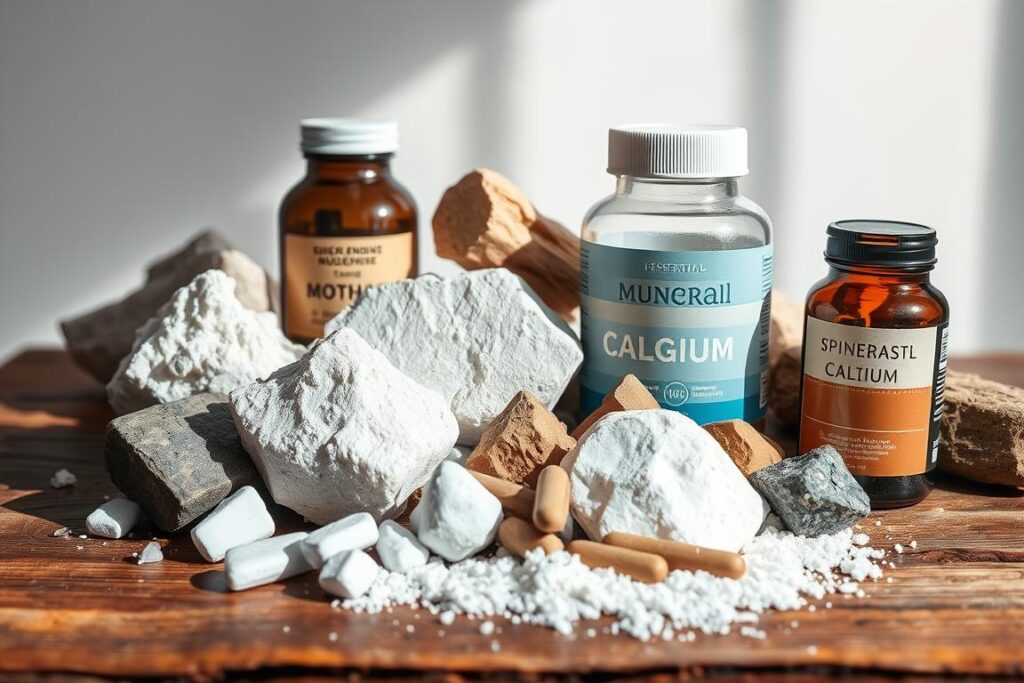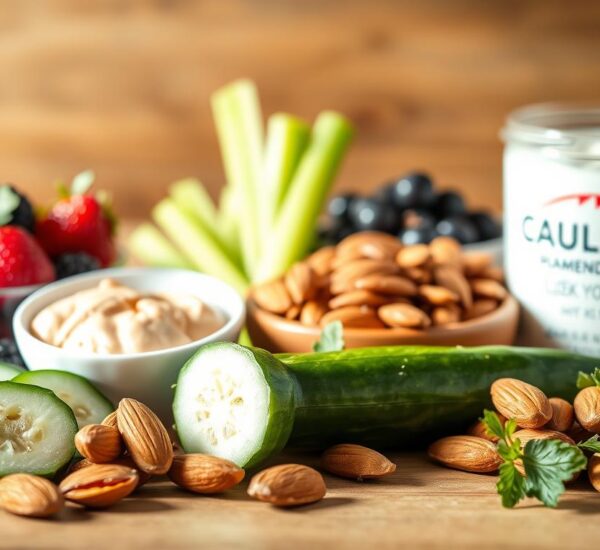Do you know if you’re getting all the essential nutrients your body needs? With so many nutrition supplements out there, it’s easy to feel lost. Our bodies need certain nutrients to work right, but we can’t make them ourselves. We have to get them from what we eat.
It’s key to keep a balance of these vitamins & minerals to stay healthy. Learning about their roles and adding them to our meals can help a lot. For more on how to boost your health, check out our article on building a strong immune system.
Key Takeaways
- Understanding the role of essential nutrients in our diet
- The importance of vitamins & minerals for overall health
- How to maintain a balanced intake of these micronutrients
- The benefits of incorporating nutrition supplements into our diet
- Tips for tracking our nutrient intake for better health
Understanding the Importance of Vitamins and Minerals
To stay healthy, it’s key to know how vitamins and minerals work in our bodies. These tiny nutrients help with energy, fighting off sickness, and keeping our tissues strong.
What Are Vitamins and Minerals?
Vitamins are tiny, organic helpers our bodies need for many tasks. They help with metabolism and keep our skin, hair, and eyes healthy. Minerals, being inorganic, support bone health and nerve function. Together, they’re vital for what we eat.
Why They Matter for Our Health
Vitamins and minerals do a lot for us. They stop diseases like scurvy and anemia. They also boost our health and might lower the chance of getting sick later on.
Eating a variety of foods gives us the vitamins and minerals we need. But some people might need extra help from supplements because of their diet or health.
Sources of Essential Nutrients
So, where do we find these important nutrients? A diet full of fruits, veggies, whole grains, lean proteins, and healthy fats is the answer. Here’s a quick look at some key sources:
| Nutrient | Food Sources | Health Benefits |
|---|---|---|
| Vitamin C | Citrus fruits, strawberries, bell peppers | Boosts immune system, supports skin health |
| Calcium | Dairy products, leafy greens, fortified plant-based milk | Essential for bone health, muscle function |
| Iron | Red meat, poultry, beans, lentils, fortified cereals | Critical for healthy red blood cells, prevents anemia |
Knowing and using these sources in our daily meals can greatly improve our health and happiness.
The Role of Vitamins in Our Wellness Journey
Vitamins are key to our health. They help our bodies work right. There are two main types: fat-soluble and water-soluble vitamins.
Fat-soluble vitamins like A, D, E, and K are stored in our fat and liver. They keep our skin, hair, and eyes healthy. They also boost our immune system. Water-soluble vitamins, like C and B vitamins, must be eaten every day because our bodies don’t store them.
Types of Vitamins and Their Functions
Vitamins do many important jobs. For instance, vitamin C helps make collagen, which is important for our skin, bones, and cartilage. B vitamins help turn food into energy for our bodies.
Here’s a quick look at the different vitamins and what they do:
| Vitamin | Function | Food Sources |
|---|---|---|
| Vitamin A | Maintains healthy skin, hair, and eyes | Sweet potatoes, carrots, dark leafy greens |
| Vitamin C | Boosts immune system, produces collagen | Citrus fruits, strawberries, bell peppers |
| B Vitamins | Energy production, nerve function | Whole grains, lean meats, fish, eggs |
Recommended Daily Intake for Adults
The amount of vitamins we need changes based on our age, sex, and other factors. Adults should eat a balanced diet to get enough vitamins. For example, adults need 60-90 mg of vitamin C each day.
To get enough vitamins, we should eat lots of fruits, veggies, whole grains, lean proteins, and healthy fats. Sometimes, dietary supplements are needed to fill any gaps in our diet.
Key Minerals for Optimal Health
## Key Minerals for Optimal Health
Minerals are key to our health, but often overlooked. They are vital for many body functions, like bone health and nerve function.
### Essential Minerals We Should Include
We need a variety of minerals in our diet. Key ones arecalcium,iron, andpotassium. Calcium is good for bones, iron for blood cells, and potassium for fluid balance and blood pressure.
To understand these minerals better, let’s look at their roles and where to find them:
| Mineral | Function | Food Sources |
| — | — | — |
| Calcium | Builds and maintains bone health | Dairy products, leafy greens, fortified foods |
| Iron | Essential for healthy red blood cells | Red meat, beans, fortified cereals, dark leafy greens |
| Potassium | Regulates fluid balance and blood pressure | Bananas, avocados, sweet potatoes, nuts |

### The Impact of Mineral Deficiencies
Not getting enough minerals can harm our health. Iron deficiency can cause anemia, and not enough calcium weakens bones. Eating a balanced diet with many nutrient-rich foods helps avoid these problems. For more tips on healthy eating, check outProsperGlow.
By knowing the importance of minerals and adding them to our diet, we can greatly improve our health.
How to Incorporate Vitamins and Minerals into Our Diet
To get the right nutrients, we need to know how to add vitamins and minerals to our meals. A good diet keeps us healthy and prevents health problems.
Best Food Sources of Vitamins
Eating a variety of nutrient-rich foods is key. This ensures we get all the vitamins and minerals we need. Here are some top sources:
- Fruits and vegetables are packed with vitamins A, C, and K, and minerals like potassium and magnesium.
- Whole grains like brown rice, quinoa, and whole-wheat bread offer B vitamins, iron, and selenium.
- Lean proteins from poultry, fish, and legumes are great for vitamin B12, iron, and zinc.
- Nuts and seeds are full of healthy fats, vitamin E, and minerals like magnesium and selenium.
Eating leafy greens like spinach boosts iron and calcium. Oranges are a good source of vitamin C.
Meal Planning for Nutritional Balance
Good meal planning is essential for a balanced diet. Here are some tips:
- First, check your diet and see where you can add more fruits and vegetables.
- Use seasonal produce to get freshness and variety.
- Make sure each meal has a mix of food groups for a wide range of nutrients.
- Think about getting help from a nutritionist or using meal planning apps to track your intake.
By paying attention to what we eat and making smart choices, we can avoid vitamin deficiency and stay healthy.
The Benefits of Supplements: Are They Necessary?
There are many supplements out there, and knowing their benefits is key. It helps us make smart choices for our health. Supplements play a big role in our wellness journey.
Supplements are great for people with special dietary needs. For example, pregnant or breastfeeding women need more nutrients for their health and baby’s. People with conditions like celiac disease or Crohn’s disease also benefit from them.
When to Consider Vitamin and Mineral Supplements
There are times when you might need vitamin and mineral supplements. These include:
- During pregnancy or breastfeeding, when nutritional demands are higher
- For individuals with restrictive diets, such as vegans or vegetarians, who may be at risk of certain nutrient deficiencies
- In cases of diagnosed deficiencies or certain medical conditions that impact nutrient absorption
- For older adults, who may experience decreased nutrient absorption due to age-related changes
Always talk to a healthcare professional before starting supplements. They can help figure out what’s best for you.
Choosing Quality Supplements
Choosing the right supplements is important. Here are some tips:
- Look for third-party certifications, such as NSF International or ConsumerLab.com, which verify the supplement’s quality and purity
- Check the label for clear information on the ingredients, dosage, and any allergens
- Be cautious of claims that seem too good to be true; good supplements have solid evidence to back them up
By being informed and careful, we can use supplements to improve our health and wellness.
Specific Vitamins and Minerals for Different Life Stages
Our nutritional needs change as we grow. It’s important to know what we need at each stage. This ensures we stay healthy.

Nutritional Needs for Children
Children need a mix of vitamins and minerals for growth. Calcium and vitamin D help build strong bones. Iron is key for healthy blood cells.
They also need vitamin C for a strong immune system and zinc for healing and making proteins. Eating foods like dairy, leafy greens, and fortified cereals is good for them.
Vitamins for Pregnant Women
Pregnant women need more of some vitamins and minerals. Folic acid is vital for the baby’s brain and spine. Iron helps the mother and the baby grow.
They also need calcium for the baby’s bones and omega-3 fatty acids for the brain. Eating well ensures a healthy pregnancy.
Essential Nutrients for Seniors
Seniors have different needs as they age. They need vitamin D and calcium for strong bones. Vitamin B12 supports nerves and blood cells.
They should also eat antioxidants like vitamins C and E. These help fight stress and keep them healthy. Good nutrition helps seniors stay independent.
Knowing what vitamins and minerals we need at each stage helps us eat right. It supports our health and well-being.
Myths and Facts About Vitamins and Minerals
Understanding vitamins and minerals is complex. It’s key to know what’s true and what’s not for our health. With so much info out there, it’s easy to get lost in myths that aren’t good for us.
Many think all supplements are the same. But, the quality can really differ. It depends on how they’re made and where the ingredients come from. So, picking supplements from trusted makers is important.
Common Misconceptions We Should Avoid
Some think we can get all nutrients from food. While food is essential, some people might need supplements. This could be due to diet limits, health issues, or special needs at different times in life.
Another myth is that more vitamins and minerals are always better. Too much of some can harm us. For example, too much vitamin A can make us dizzy, and too much iron can upset our stomach.
The Truth Behind Supplements
Supplements can help fill diet gaps. But, they shouldn’t replace a good diet. Always talk to a doctor before starting any supplements to make sure they’re right for you.
The table below shows the truth about vitamins and minerals, debunking common myths:
| Misconception | Fact |
|---|---|
| All supplements are created equal. | Supplement quality varies by manufacturer and ingredients. |
| We can get all necessary nutrients from food alone. | Some individuals may need supplements due to dietary restrictions or health conditions. |
| More vitamins and minerals are always better. | Excessive intake can lead to adverse health effects. |
Knowing the truth about vitamins and minerals helps us make better choices. This knowledge helps us stay healthy and avoid too much of a good thing.
The Connection Between Vitamins, Minerals, and Mental Health
It’s key to understand how vitamins, minerals, and mental health are connected. We usually focus on our physical health. But, our mental well-being is just as vital.
Nutrients That Support Brain Function
Some nutrients are great for brain health. For example, omega-3 fatty acids are important for brain function and growth. They can also help with depression symptoms.
For more on how food affects our mind, check out this article.
Vitamin D is also key for our health. Not having enough of it can lead to mental health problems.
The Impact of Deficiencies on Mood
Not having enough nutrients can really affect our mood. For instance, not enough vitamin D can cause depression and seasonal affective disorder.
It’s important to eat a balanced diet. This includes nutrient-rich foods and being mindful of our daily intake. This helps support our mental health.
Tracking Our Nutrient Intake for Better Health
To get the most from vitamins and minerals, we need to track what we eat every day. This helps us make sure we’re getting all the nutrients we need. It also guides our choices about food and supplements.
Nutritional Tracking Tools
There are many tools and apps to help us keep an eye on our nutrient intake. Apps like MyFitnessPal and Cron-o-meter let us log our food and find out if we’re missing any nutrients. The USDA’s Dietary Guidelines website is also a great resource for healthy eating tips and nutrition plans.
Personalized Nutrition Planning
It’s important to set goals for our nutritional needs to stay healthy. Creating a nutrition plan that fits our health goals is key. We need to think about our age, lifestyle, and health to make sure we’re getting the right nutrients.
Using these tools and strategies helps us manage our nutrition. This way, we can enjoy the benefits of a balanced diet.
## FAQ
### Q: What are the essential vitamins and minerals that we need for optimal health?
A: We need vitamins and minerals like calcium, iron, and vitamin D for good health. They help our skin, hair, and eyes stay healthy. They also support our brain and overall wellbeing.
### Q: How can we ensure we are getting enough vitamins and minerals in our diet?
A: Eating a balanced diet with fruits, veggies, and whole grains is key. Meal planning and tracking what we eat helps too.
### Q: What are the benefits of taking vitamin and mineral supplements?
A: Supplements can fill diet gaps, like during pregnancy or for people with certain health issues. But, always choose quality ones and talk to a doctor first.
### Q: Can we get all the nutrients we need from food alone?
A: Yes, food can give us most nutrients. But, some might need supplements, like in certain life stages or health conditions.
### Q: How can we track our nutrient intake for better health?
A: Use apps or websites to track nutrients. Setting nutritional goals and making a plan can keep you motivated for better health.
### Q: Are all supplements created equal?
A: No, not all supplements are the same. Look for high-quality ingredients and reputable brands. Make sure they are tested for purity and potency.
### Q: What is the connection between vitamins, minerals, and mental health?
A: Vitamins like omega-3 and vitamin D are important for our brain and mental health. Not having enough can affect our mood and wellbeing.
### Q: How do our nutritional needs change during different life stages?
A: Our needs change with age, like in childhood, pregnancy, or older age. For example, kids need nutrients for growth, and pregnant women need folic acid and iron for their baby.
### Q: What are some common misconceptions about vitamins and minerals?
A: Some think all supplements are the same, or that food alone gives us all we need. Knowing these myths helps us make better choices for our health.
### Q: Why are vitamins and minerals essential for our overall health and wellbeing?
A: Vitamins and minerals keep our skin, hair, and eyes healthy. They also support our brain and overall health, helping prevent chronic diseases.



